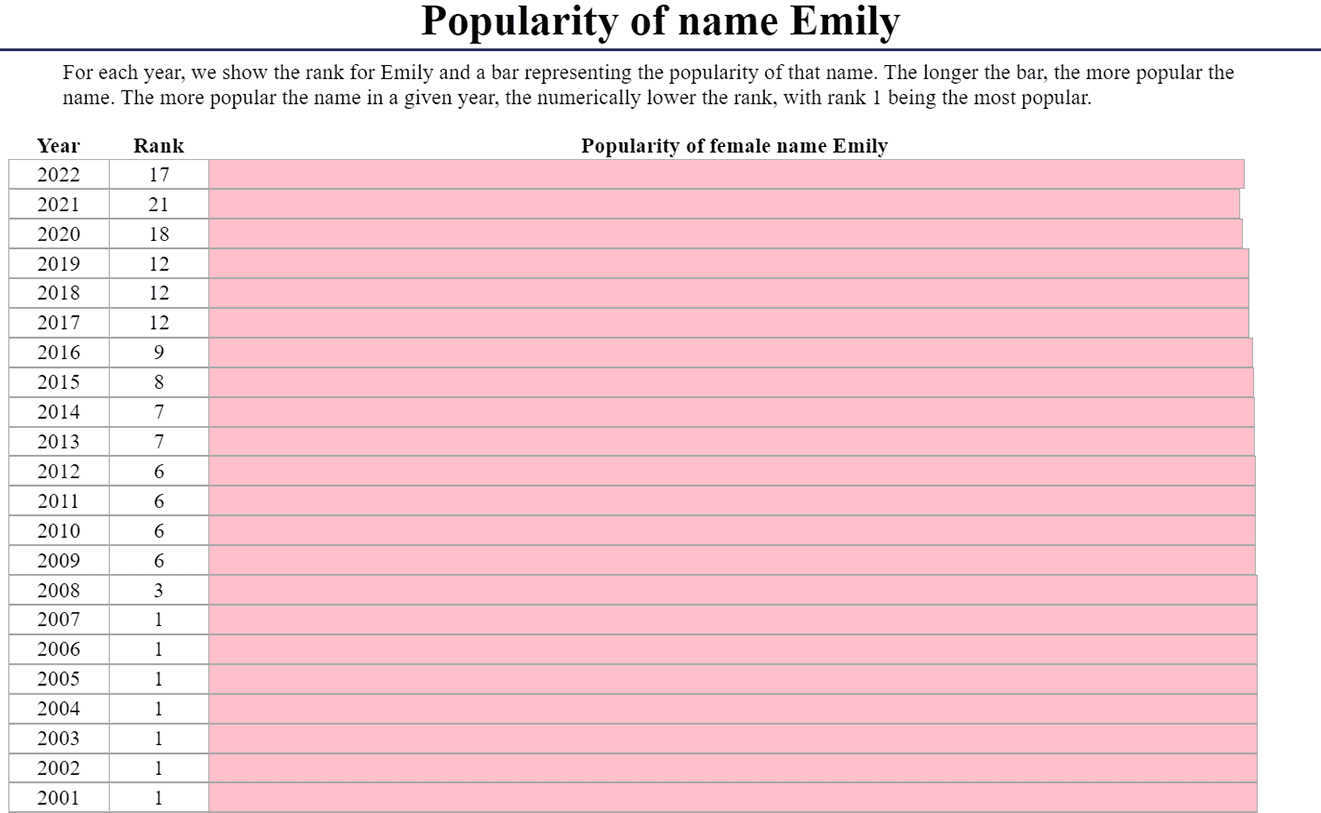Emily Name Overview
- Meaning: “industrious” or “striving” or “rival”
- Gender: Female
- Origin: Latin
- Pronunciation: “EH-muh-lee”
- Popularity: Ranked #17 in the US in 2022 – very popular
- In Hebrew: Emily is spelled אֶמִילִי in Hebrew
- Biblical verse: The name Emily is not mentioned in the Bible
- Spiritual meaning: Symbolizes diligence and perseverance
- Nicknames: Emi, Mila, Emmy, Lila, Ems, Emilia…
- Variations: Emilia, Emmeline, Amelie, Mila, Emelyn, Emmalyn…
Choosing a name for your child is an important decision that reflects your hopes, aspirations, and values. If you’re considering the name Emily, you’ve come to the right place.
In this article, we will explore the origin, meaning, popularity, biblical connections, spiritual significance, nicknames, variations, and interesting facts surrounding the name Emily.
Whether you’re an expecting parent or someone who already bears the name, join us on this journey to discover the depth and richness behind the name Emily.
Emily Name Meaning, Origin & Popularity
The name Emily is of Latin origin and is derived from the Roman family name Aemilius. The Aemilius family held prominence and power in ancient Rome. The name Emily is believed to have multiple meanings, including “rival,” “industrious,” and “striving.” It may have roots in the Latin word aemulus, which signifies a sense of competition, or the Greek term aimylos, which conveys qualities of being wily or persuasive.
Emily is a strong and gentle name that originated from the medieval Roman name Aemilius. Its translation as “rival” or “striving” reflects the determination and tenacity associated with the name. The name gained popularity in English-speaking countries through its association with the German House of Hanover, which ascended the English throne in the 18th century. Notably, two princesses named Amelia, who were nicknamed Emily, contributed to the name’s rise to prominence.
The popularity of the name Emily extends around the world. It is widespread in the UK, Australia, and Ireland. Variations of the name exist in various languages, including Swedish, Finnish, French, and Dutch. The name Emily offers a sense of timeless charm and has become a beloved choice for parents seeking a name that embodies qualities of determination and emulation.


In the United States, Emily held the top position as the most popular baby name for girls from 1996 to 2007, and consistently ranked in the top 10 from 1991 to 2016, according to the Social Security Administration. The latest statistics from 2022 reveal that Emily is currently ranked as the 17th most popular name for girls in the United States. Similarly, Emily remains a popular choice in English-speaking countries such as Canada, England, Scotland, Wales, Ireland, Australia, and New Zealand.
In the United Kingdom, Emily experienced a slight decline in popularity, ranking 49th in 2019. However, it continues to maintain its position in the top rankings. According to the Office for National Statistics, Emily ranked as the 4th most popular name for girls among mothers above 35 in England and Wales in 2021. It also ranked 58th, 29th, and 19th for mothers under 25, 25-29, and 30-34 years, respectively.
The enduring popularity of the name Emily speaks to its widespread appeal and the qualities it represents. Its association with determination, rivalry, and emulation resonates with parents who seek a name that inspires their children to face life’s challenges with diligence and enthusiasm.
Emily Name Pronunciation
The pronunciation of the name Emily is straightforward and consistent. It is typically pronounced as “EM-uh-lee” or “EM-i-lee” in English-speaking countries. The emphasis is on the first syllable, “EM.” The name is easy to pronounce and has a melodic flow.
Emily Name Meaning Hebrew
In Hebrew, the name Emily is associated with the Hebrew equivalent “Emili,” spelled as אֶמִילִי. Emili carries the meaning of “rivalry” in Hebrew. It is worth noting that while Emili is the more popular Hebrew variation, Emily and Amelia are also used in Hebrew-speaking communities.
The Hebrew connection adds a unique linguistic and cultural aspect to the name Emily, providing an alternate interpretation of its meaning. The Hebrew spelling, אֶמִילִי, highlights the distinctiveness of the name when viewed through a Hebrew lens. It is fascinating how names can take on different connotations and significance across various languages and cultures, and the Hebrew variation of Emily exemplifies this beautifully.
Emily Name Meaning Biblical
While the name Emily itself is not directly mentioned in the Bible, we can explore biblical themes that align with the meaning of the name. The name Emily carries the meanings of “industrious,” “striving,” and “rival.” In the Bible, we find verses that encompass these themes and convey a similar message.
One relevant verse is Ecclesiastes 9:10, which states, “Whatever your hand finds to do, do it with all your might…” This verse emphasizes the importance of diligence, hard work, and striving to achieve one’s goals. It resonates with the industrious nature associated with the name Emily.
Another verse that reflects the concept of rivalry or competition is Philippians 3:14, which says, “I press on toward the goal to win the prize for which God has called me heavenward in Christ Jesus.” This verse encourages perseverance and a determined spirit, highlighting the striving aspect of the name Emily.
While the name Emily may not have a direct biblical reference, these verses capture the essence of the name’s meanings. They inspire individuals to approach life with diligence, determination, and a competitive spirit.
By embodying these qualities, individuals named Emily can find encouragement and guidance from the biblical principles of hard work and perseverance.
Spiritual Meaning of the Name Emily
The name Emily holds spiritual significance that can be inferred from its meanings and the biblical themes associated with it. The name’s connotations of being industrious, striving, and rivalrous can be connected to deeper spiritual principles.
In a spiritual context, Emily represents the embodiment of determination and diligence. It encourages individuals to embrace their God-given talents and pursue their aspirations with unwavering commitment. The name inspires believers to work diligently, not only in their earthly endeavors but also in their spiritual growth and service to others.
Furthermore, the name Emily reflects the concept of embracing healthy competition and striving to be the best version of oneself. It reminds individuals to continually seek personal growth, overcome challenges, and pursue excellence in all aspects of life. In a spiritual sense, this can be interpreted as striving to fulfill one’s purpose, deepen one’s faith, and cultivate virtues such as resilience, perseverance, and humility.
Emily Nicknames
Finding the perfect nickname can add a touch of personality and uniqueness to a name. If you, your daughter, or someone you know bears the lovely name Emily, you might be interested in exploring some delightful nicknames that capture the essence of this timeless name.
Discover your favorite nickname and give a unique twist to the name Emily!
- Emi: A short and sweet variation of Emily that retains its charm and familiarity.
- Mila: A trendy and stylish nickname derived from the sounds in Emily.
- Emmy: A playful and endearing nickname that adds a touch of warmth to the name.
- Lila: A melodic and graceful nickname that captures the essence of Emily’s sounds.
- Ems: A casual and friendly nickname that gives a relaxed and approachable vibe.
- Emilia: A longer form of Emily that adds an elegant and sophisticated touch.
- Millie: A vintage-inspired nickname that exudes a sense of timeless appeal.
- Mimi: A cute and whimsical nickname that brings a sense of joy and playfulness.
- Ellie: A popular nickname option that offers a blend of sweetness and simplicity.
- Emme: A modern and sleek variation of Emily that has a contemporary feel.
These nicknames provide a variety of options for personalizing the name Emily while retaining its essence. Each nickname carries its unique flair and can be chosen based on personal preference and individual style.
Emily Name Variations
In the world of names, variations provide a fascinating exploration of the diverse forms a name can take. Let’s delve into the realm of Emily name variations, discovering alternative renditions that add a touch of uniqueness to this beloved name.
- Emilia: This Italian variation infuses a touch of elegance and sophistication into the name Emily. With a melodic sound, Emilia exudes a timeless charm of its own.
- Emmeline: A slightly longer form of Emily, Emmeline carries an air of grace and refinement. This variation has gained popularity in recent years for its classic yet contemporary appeal.
- Amelie: With its French flair, Amelie offers a chic and sophisticated twist to the name Emily. It evokes a sense of charm and allure, making it an intriguing alternative.
- Mila: Derived from the same origin as Emily, Mila adds a dash of modernity and trendiness to the name. Its concise and stylish nature makes it a popular choice among parents.
- Emelyn: This unique variation offers a fresh perspective on the name Emily. With its distinctive spelling, Emelyn stands out while still maintaining the inherent qualities of its source name.
- Emmalyn: Combining the elegance of Emily with a touch of contemporary style, Emmalyn strikes a perfect balance between classic and modern. It carries an air of sophistication and captures attention with its distinctive sound.
- Amalia: Drawing inspiration from Emily’s roots, Amalia offers a captivating alternative. With its regal and timeless appeal, this variation conveys strength and beauty.
- Milena: A variation with Eastern European origins, Milena adds a touch of exoticism and intrigue to the name Emily. Its rhythmic sound and cultural richness make it a compelling choice.
- Aemilia: This variation harkens back to the ancient Roman origins of the name. Aemilia showcases a sense of history and tradition while retaining the charm and familiarity of Emily.
- Emelda: With its unique sound and uncommon spelling, Emelda offers an uncommon twist to the name Emily. This variation exudes an air of individuality and stands out among more traditional renditions.
These captivating variations provide an array of choices for those seeking to embrace the name Emily with a personalized touch. Whether you prefer a classic and elegant take or a more contemporary and distinctive form, these alternatives offer a delightful exploration of the name’s versatility.
Middle Name for Emily
When choosing a middle name for Emily, there are endless possibilities to explore, allowing you to create a unique and personalized combination. Here are some distinctive middle name options that beautifully complement the name, Emily:
- Aurora: A middle name that brings a touch of enchantment and magic, adding a sense of wonder to Emily’s name.
- Lillian: A middle name that exudes a classic and refined aura, perfectly complementing the grace and elegance of Emily.
- Genevieve: A middle name that carries an air of sophistication and grace, infusing an element of timeless beauty into Emily’s name.
- Harper: A middle name that brings a contemporary and artistic flair to Emily’s name, showcasing her individuality.
- Coraline: A middle name that offers a unique and whimsical twist, capturing attention and making Emily’s name truly distinctive.
- Penelope: A middle name that exudes a sense of charm and playfulness, creating a delightful combination with Emily.
- Adelaide: A middle name that adds a touch of regality and grandeur, giving Emily’s name a majestic presence.
- Juniper: A middle name that embraces nature’s beauty and invokes a sense of wanderlust, providing a distinctive and adventurous combination with Emily.
- Celestine: A middle name that carries an ethereal and celestial quality, giving Emily’s name a touch of magic and mystique.
These middle name options offer a glimpse into the myriad possibilities to enhance the beauty and individuality of the name Emily. Feel free to explore further and select a middle name that resonates with your style and vision for your child.
Sibling Names for Emily
When considering sibling names for Emily, finding names that harmonize well together while maintaining their individuality is vital. Here are some name suggestions that complement Emily beautifully:
Female Sibling Names:
- Amelia: A name that shares a similar timeless charm with Emily, Amelia creates a harmonious and elegant pairing.
- Abigail: A name that pairs elegantly with Emily, Abigail exudes a timeless charm and grace.
- Charlotte: With its classic appeal and refined sophistication, Charlotte creates a harmonious combination with Emily.
Male Sibling Names:
- Samuel: Combining strength and versatility, Samuel complements Emily with its classic and enduring nature.
- Caleb: With its gentle yet confident sound, Caleb provides a balanced and harmonious pairing with Emily.
- Julian: Offering a touch of sophistication and modernity, Julian creates a distinctive combination with Emily.
These sibling names strike a balance between individuality and cohesion, creating a cohesive and appealing sibling set with Emily. Remember to consider your personal preferences and the overall style and feel you desire for your family.
Famous People with the Name Emily
- Emily Dickinson: A renowned American poet who is celebrated for her profound and introspective poetry. Her works continue to inspire and resonate with readers around the world.
- Emily Blunt: A versatile British actress known for her captivating performances in films such as “The Devil Wears Prada,” “Sicario,” and “A Quiet Place.” Her talent and versatility have earned her critical acclaim and numerous accolades.
- Emily Brontë: An English novelist and poet best known for her novel “Wuthering Heights.” Her imaginative storytelling and vivid characters have made her a prominent figure in English literature.
- Emily Watson: A talented British actress recognized for her powerful performances in films like “Breaking the Waves,” “Punch-Drunk Love,” and “Hilary and Jackie.” Her ability to portray complex and emotionally charged characters has garnered widespread praise.
- Emily Mortimer: An English-American actress known for her roles in films such as “Match Point,” “Shutter Island,” and the TV series “The Newsroom.” Her captivating on-screen presence and versatile acting skills have made her a respected figure in the entertainment industry.
- Emily Deschanel: An American actress recognized for portraying Temperance Brennan in the TV series “Bones.” She has garnered acclaim for portraying a forensic anthropologist and her commitment to environmental and animal rights activism.
These remarkable individuals have made significant contributions to their respective fields, captivating audiences with their talent, creativity, and dedication. Their achievements serve as inspiration for aspiring artists, actors, writers, and individuals who share the name, Emily.
Facts about the Name Emily
- Origin and Meaning: The name Emily has a Latin origin and is derived from the Latin name “Aemilia,” which means “rival” or “industrious.” It is also associated with the Greek name “Amalia,” meaning “hardworking” or “striving.”
- Historical Usage: The name Emily has been in use since the Middle Ages, gaining popularity in the English-speaking world during the 18th and 19th centuries. It has a long-standing presence in Western cultures.
- Popularity: Emily has consistently been a popular name in various English-speaking countries. In the United States, it ranked #1 for twelve consecutive years from 1996 to 2007. However, its popularity has slightly declined in recent years.
- Literary References: The name Emily holds literary significance. Emily Brontë, the author of the classic novel “Wuthering Heights,” is one of the notable literary figures associated with the name.
- Famous Bearers: Emily has been embraced by numerous accomplished individuals in various fields. While it is not possible to provide an exhaustive list, notable examples include Emily Dickinson (poet), Emily Blunt (actress), and Emily Watson (actress). These individuals have made significant contributions to their respective domains.
Emily Name Stereotypes
Stereotypes associated with names can perpetuate certain assumptions and biases. However, it’s essential to recognize that these stereotypes are often based on generalizations and may not accurately reflect an individual’s personality or character.
Here are a few stereotypes that have been associated with the name Emily. However, it’s important to remember that individuals are unique and cannot be defined solely by their names:
- Delicateness: Due to its soft and melodic sound, the name Emily may be stereotypically associated with a delicate and gentle nature. However, it’s crucial to acknowledge that individuals named Emily can possess a wide range of personalities and traits.
- Femininity: The name Emily is predominantly given to girls, and as a result, it may be associated with traditional feminine qualities. However, it’s important to remember that gender stereotypes should not limit or define an individual’s abilities, interests, or ambitions.
- Conformity: Given the popularity of the name Emily, there may be a stereotype that individuals with this name tend to conform to societal norms and expectations. However, it’s essential to recognize that people named Emily, like anyone else, have diverse perspectives, unique experiences, and the capacity to challenge conventions.
- Reserved or Introverted: Some may assume that individuals named Emily are more reserved or introverted based on the gentle and refined nature often associated with the name. However, it’s important to remember that personality traits vary significantly among individuals, and not all people named Emily fit this stereotype.
- Traditional Values: The name Emily may be associated with a perception of traditional values or conservatism. However, it’s essential to approach these assumptions with an open mind, as values and beliefs can differ significantly among individuals, regardless of their names.
It’s crucial to approach names without preconceived notions or stereotypes, as they can lead to unfair judgments or expectations. Ultimately, each person named Emily is unique and should be recognized for their individuality rather than conforming to stereotypes associated with their name.
Emily Meaning in Other Culture and Languages
Emily name meaning in Greek
The name Emily does not have a specific Greek origin or meaning. It is an English name derived from the Latin name “Aemilia.”
Emily name meaning in Italian
In Italian, the name Emily is spelled as “Emilia.” It is derived from the Latin name “Aemilia,” which means “rival” or “emulating.”
Emily name meaning in Latin
The name Emily originates from the Latin name “Aemilia,” which means “rival” or “emulating.”
Emily name meaning in Spanish
In Spanish, the name Emily is spelled as “Emilia.” It shares the same Latin origin as the English name and carries the meaning of “rival” or “emulating.”
Emily FAQs
Why is the name Emily so hated?
The name Emily being hated is subjective and based on personal opinions (like being ‘boring,’ ‘generic,’ overused). While some individuals may express a dislike for the name, it’s essential to recognize that preferences vary greatly, and not everyone will share the same sentiment. It’s important to respect individual choices and understand that the reasons behind any perceived dislike may vary from person to person.
Why is the name Emily so popular?
The popularity of the name Emily can be attributed to several factors. It has a pleasing sound, is easy to pronounce, and has been widely used for several decades. Additionally, popular cultural references, influential individuals, and positive associations with the name may contribute to its sustained popularity.
What is something positive about the name Emily?
One positive aspect of the name Emily is its timeless and elegant charm. It has a classic and melodic sound that appeals to many. Additionally, individuals named Emily are often described as kind, intelligent, and compassionate, which can be seen as positive qualities associated with the name.
How old is the name Emily?
The name Emily has a long history and can be traced back to ancient times. It originated from the Latin name “Aemilia,” which was derived from the Roman family name “Aemilius.” The name has been in use for centuries, but its popularity has varied throughout different periods.
Is Emily a good name?
The perception of whether Emily is a good name is subjective and varies among individuals. Many people find the name Emily appealing, elegant, and suitable for children and adults. Ultimately, the suitability and preference of the name depend on personal taste and cultural context.
Final Thoughts
In conclusion, the name Emily holds a timeless charm and widespread popularity. While personal opinions on the name may vary, it’s important to respect individual preferences and understand that the name’s perception can be subjective.
Emily has a rich history and is associated with positive qualities, making it a favorable choice for many. Ultimately, whether Emily is considered a good name or not depends on personal taste and cultural context.



